|
|
|
Sort Order |
|
|
|
Items / Page
|
|
|
|
|
|
|
| Srl | Item |
| 1 |
ID:
133937
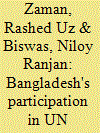

|
|
|
|
|
| Publication |
2014.
|
| Summary/Abstract |
This article argues that the participation of the Bangladeshi armed forces in UN peacekeeping has produced positive benefits for civil-military relations in the country and that this process is best explained by reference to concordance theory, as propagated by Rebecca Schiff. Unlike traditional theories of civil-military relations, concordance theory highlights dialogue, accommodation and shared values or objectives held by the military, the political elites and society. We argue in this paper that peacekeeping has gradually emerged in Bangladesh as an issue where all three partners are converging and prone to hold similar views. This may have a profound impact upon Bangladeshi politics whereby the chances of military intervention in domestic politics will lessen. This paper helps in understanding the implications of Bangladesh's involvement in UN peace missions, an issue on which little work has been conducted until now despite the fact that it has important implications for both the Bangladesh state and its armed forces.
|
|
|
|
|
|
|
|
|
|
|
|
|
|
|
|
| 2 |
ID:
180714
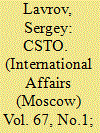

|
|
|
|
|
| Summary/Abstract |
ON OCTOBER 7, 2020, under Russia's rotating presidency of the Collective Security Treaty Organization (CSTO), a roundtable titled "CSTO: Strategic Development Guidelines" was held at the Russian Foreign Ministry Reception House, timed to coincide with CSTO Founding Day.
|
|
|
|
|
|
|
|
|
|
|
|
|
|
|
|
| 3 |
ID:
115921
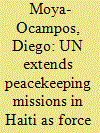

|
|
|
| 4 |
ID:
172162
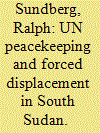

|
|
|
|
|
| Summary/Abstract |
Does UN peacekeeping reduce the number of people forcibly displaced by violence? While previous research has found that the presence and size of peacekeeping deployments can reduce violence, little is known about how peacekeepers affect other aspects of civilian protection. Using original data on sub-national events of forced displacement and the location and size of UN troop deployments this study systematically evaluates the criticized efforts of UNMISS in South Sudan, while simultaneously testing hypotheses on peacekeepers and forced displacement. It is hypothesized that increasing numbers of troops affect the flight equation among civilians through the promise of and actual deterrence of violence. These deterrence-based hypotheses are also discussed in relation to the South Sudan context, creating scope conditions for their possible application in this case. The statistical analysis provides, however, no robust evidence for peacekeepers reducing the occurrence or levels of forced displacement, and only weak evidence of displaced congregating in larger numbers around peacekeeping locations. The paper ends by arguing that the theoretical argument provided may still be valid, but that an effect was not feasible to identify in South Sudan where the peacekeeping mission – despite its comparatively large numbers – lacks credible deterrent capacity.
|
|
|
|
|
|
|
|
|
|
|
|
|
|
|
|
| 5 |
ID:
133531
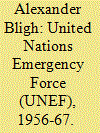

|
|
|
|
|
| Publication |
2014.
|
| Summary/Abstract |
With the conclusion of almost every round of hostilities between Israel and one of its neighbours the idea of international forces is being raised once again. This is basically an improved and revised initiative for stationing international forces to supervise (and perhaps impose) a ceasefire between the parties. In the Arab-Israeli framework, it is in essence the old approach which has been in service since 1948. Only one force, UNEF, stands out as not having been approved by the Security Council and clearly failing its intended but vaguely defined mission. The current analysis leads to the conclusion that in this particular regional conflict, the positioning of international forces must always come within the context of a more comprehensive settlement. That way, by violating a force's mandate, each party would lose either land or diplomatic recognition. Moreover, if a Middle Eastern peacekeeping operation is to take place in the future, it has to include organic units of the warring parties, encouraging peaceful interactions. Such units should reinforce organic units from countries acceptable to all parties. Hopefully, future missions, taking into consideration some of the approaches suggested here, can continue to contribute to regional processes for peace.
|
|
|
|
|
|
|
|
|
|
|
|
|
|
|
|
| 6 |
ID:
132800
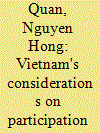

|
|
|
|
|
| Publication |
2014.
|
| Summary/Abstract |
True UN peacekeeping started in 1948 as an important initiative during the period of East-West confrontation. At that time, after the Second World War, none of the two major powers, the United States and the Soviet Union, emerged as absolute dominant. Therefore, the two powers decided to create a "neutral" group called "peacekeepers" under the auspices of the UN. The initiative was accepted by the majority of UN members and was expected to work as a mechanism to prevent and settle conflicts without one of the two big powers taking advantage and/or to prevent war in certain strategic areas.
|
|
|
|
|
|
|
|
|
|
|
|
|
|
|
|
| 7 |
ID:
137617
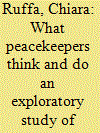

|
|
|
|
|
| Summary/Abstract |
This exploratory article points out how armies differ in the performance of their daily military activities during a peacekeeping mission and analyses the role of contrasting perceptions of the mission operational environment in explaining this variation. As a first step, this article documents systematic variations in the way French, Ghanaian, Italian, and Korean units implement the mandate of the UN mission in Lebanon in their daily military activity. Second, it shows that the four armies also interpret or “construct” the operational environment differently and in a way that is consistent with their different military behavior. Third, preliminary evidence suggests that previous experiences of each army influence the way in which the operational environment is constructed. Data were collected combining participant observation in Southern Lebanon with questionnaires and interviews. This article thus builds on sociological works on different operational styles but takes a methodological approach closer to that in security studies.
|
|
|
|
|
|
|
|
|
|
|
|
|
|
|
|
| 8 |
ID:
132111
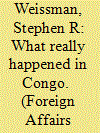

|
|
|
|
|
| Publication |
2014.
|
| Summary/Abstract |
It didn't take long for Congo's transition from Belgian colony to sovereign state to turn ugly. Both the Soviet Union and the United States were keeping a close eye on the mineral-rich country at the heart of Africa when, on June 30, 1960, it gained independence under a democratically elected government headed by Prime Minister Patrice Lumumba. A charismatic nationalist, Lumumba led the only party in parliament with a nationwide, rather than ethnic or regional, base. Within days, however, Congo's troops mutinied against their all-white officer corps (a holdover from the colonial era) and started terrorizing the European population. Belgium responded by sending forces to reoccupy the country and helping Congo's richest province, Katanga, secede. The United States, declining the appeals for help from the new Congolese government, instead threw its support behind a UN peacekeeping mission, which it hoped would obviate any Congolese requests for Soviet military assistance. But Lumumba quickly came into conflict with the UN for its failure to expel the Belgian troops and end Katanga's secession. After issuing a series of shifting ultimatums to the UN, he turned to Moscow for help, which responded by sending transport planes to fly Lumumba's troops into Katanga.
|
|
|
|
|
|
|
|
|
|
|
|
|
|
|
|
|
|
|
|
|